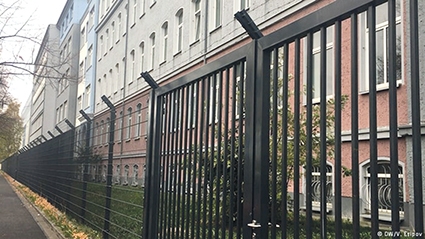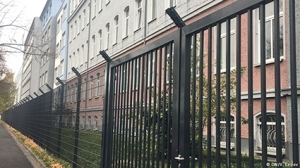Germany Cracks Down on Georgian Asylum Seekers
The number of Georgian asylum seekers in Germany has increased significantly since the EU granted Georgian citizens the right to visa-free travel. Does this rise spell the end of visa-free travel for Georgians? How are Germany and Georgia tackling the issue?
Living behind austere barbed wire fences and the bleak walls of the initial reception facility in the Dresden district of Friedrichstadt are 500 people seeking new lives in Germany. Most have fled from war-torn regions like Syria, Iraq, and Afghanistan. Yet, many also hail from a democratic and peaceful country: one-fifth of the inhabitants are Georgian.
In March 2017, the European Union declared that Georgian citizens could visit visa-free for up to 90 days. Many Georgian’s celebrated the collective sense that Georgia was beginning to move closer towards European membership. However, Georgia may risk losing this privilege due to the large increase in citizens not just visiting Europe, but also seeking asylum.
Since the ruling that Georgian citizens no longer need visas, the number of asylum seekers coming to Germany tripled. According to figures from the Federal Office for Migration and Refugees (BAMF), 2,976 Georgians applied for asylum in Germany between January and July this year.
Many applicants seek asylum on grounds of political persecution. Yet, only 2% of applications are accepted as German authorities fail to find evidence. Eter Hachmann, a Georgian who has legally worked in Germany for eight years, told the Deutsche Welle German news outlet that she believes Georgians are attracted to Germany as it offers higher wages and a much better standard of living. Indeed, the German state provides asylum seekers with accommodation and 400 Euros per month, which is much higher than the average salary in Georgia.
However, the press spokesman of the Saxon Refugee Council, Mark Gaertner, described the authorities’ actions as “ruthless”. He does not regard Georgian refugees as “economic migrants.” According to him, many children with disabilities are being sent back to Georgia, where they cannot receive the qualified medical care they require. This could pose a threat to life, which can be regarded as legitimate grounds for asylum.
Nonetheless, many believe that some asylum seekers are taking advantage of the system. German politician Stephan Meyer told Die Welt newspaper that it is “brazen and unacceptable” to abuse visa-freedom “in order to apply for asylum that will not be granted just to receive welfare payments and take advantage of our healthcare system.”
Georgian’s seeking asylum in Germany are putting additional strain on the immigration system in Germany, which has struggled to keep up with the number of migrants arriving since the beginning of the refugee crisis in 2015.
The crisis is fuelling right-wing politics. Migration is a painful issue which plays an important element in electoral politics across Europe, especially in Germany. The far-right party ‘Alternative for Germany’ uses anti-immigrant rhetoric to gain voters, which has proved relatively successful. They became the third-largest party in Germany after the 2017 federal election, winning 94 seats in the Bundestag, significant for a party which had previously never won seats.
The crime rate of refugees in Germany contributes to the argument of far-right parties. In 2016, prior to the visa liberalization, Georgian nationals contributed to 1.1 percent of the total number of migrants who are criminal suspects, the highest figure among ex-Soviet countries aside from Russia.
Deporting Georgians is a costly undertaking. According to the Saxon Refugee Council, each charter flight used to send Georgians back to Tbilisi costs roughly 95,000 Euros. Two charter planes carrying about 100 Georgians each flew from Leipzig in September and October. According to the Saxon Ministry of the Interior, there are currently 511 Georgian citizens in Saxon whose applications were rejected, meaning they will also be flown back.
German and Georgian governments are working to tackle the problem. Germany is considering following in the footsteps of France, once a favorite among Georgian asylum seekers, to list Georgia as a safe country. This would make it easier to reject applications. Since France added Georgia to its list of safe countries, asylum denials have become more common.
Moreover, the German government has warned that Georgia may lose its travel privileges should the trend continue. If the rate of increase nears the 50 percent threshold set by the EU, then member states may apply the so-called Suspension Mechanism designed to ensure that visa-free travel is not abused.
The Ambassador to Germany, Elguja Khokrishvili, wrote in a statement to Deutsche Welle that measures have been implemented in Georgia such as an “intensive and extensive information campaign, amendments to the law on criminal prosecution for aiding and abetting illegal migration and tighter controls on departure.” Applications have indeed fallen. “The figures from September show a 77.7 percent decrease compared to January 2018.”
The decrease gives reason to believe that the measures are relatively effective. The question remains as to whether the numbers will continue to fall in the coming months.
By Amy Jones
Image source: Deutsch Welle












